Full-time missionaries begin their service at one of the Church's 15 missionary training centers (MTCs) worldwide. The Ghana MTC in West Africa was established in 2002 and is a choice place where staff, teachers, and leaders strive to serve the individual needs of each missionary who comes to receive training.
The length of training for missionaries at the Ghana MTC is 11 days, unless a missionary is called to learn French or English for six weeks. Each group arrives and departs together. The number of missionaries in a group ranges from 50 to 65, but can go up to the MTC capacity of 96, with missionaries in the group divided into individual classes consisting of eight to ten missionaries each.
Missionaries trained at the Ghana MTC come from and serve in a variety of African countries, including Benin, Democratic Republic of the Congo, Ethiopia, Ghana, Ivory Coast, Kenya, Liberia, Madagascar, Nigeria, Republic of the Congo, Sierra Leone, Togo, Cameroon and South Sudan. Others who are called to serve in Africa come from nations outside of Africa—such as the United States, Great Britain, and the islands of the South Pacific—and come to Ghana for their training. Training is conducted in both English and French for those who already speak those languages, which are the two major mission languages in African nations.
When should missionaries arrive?
Missionaries should arrive at the Ghana MTC no later than Friday at noon. Many arrive on Thursday night. The first Friday is in-take day where missionaries' papers are verified, training materials are explained, medical history is noted, and family history research is augmented.
What is the typical 11-day schedule?
The typical missionary day is filled with class instruction, daily opportunities for teaching progressing investigators, physical exercise and sports, and meals prepared by the wonderful kitchen staff. Weekly Sunday meetings, and devotionals include instruction from members of the Africa West Area Presidency, MTC leaders, and recorded talks by members of the Quorum of the Twelve Apostles. Missionaries will also have personal preparation time to read, ponder, and write to family and friends.
When do these devotionals take place?
The Robisons present the doctrine of Christ in a series of orientation meetings, devotionals and training sessions. During the welcome meeting, the theme of obedience is introduced with a special focus upon understanding the doctrine. At the first Sunday night devotional, the themes of faith and repentance are presented. Covenants and baptism are the topics of the Monday evening temple preparation seminar and the following Sunday the Gift of the Holy Ghost and "Enduring" comprise the wrap-up devotional.
Who attends the general meetings?
All missionaries participate in all the general training, devotionals and training seminars.
Do missionaries need to participate?
The missionary training center experience can be fulfilling and spiritually edifying. Learning to teach the gospel in order to help in the work of establishing the Lord's kingdom throughout the world is a challenging task that will stretch your capacity and capability. The spiritual blessings that accompany this work will bring about great personal growth.
What do missionaries wear?
Missionaries (elders) wear short-sleeved white shirts, ties, dark slacks, and Church shoes. The sisters wear most dresses suitable for Church attire. When attending the temple, the elders wear long-sleeved white shirts.
What happens after the MTC experience?
After 11 short days, each missionary departs the MTC for his/her assigned field of labor. Except for those serving in Accra, all missionaries depart by plane.
Will missionaries participate in the temple?
Missionaries will also have the opportunity to attend the Accra Ghana Temple during their stay at the MTC. Well over 50% of those who enter the MTC have not yet been to the temple. This experience represents the highlight of their stay at the MTC.





















